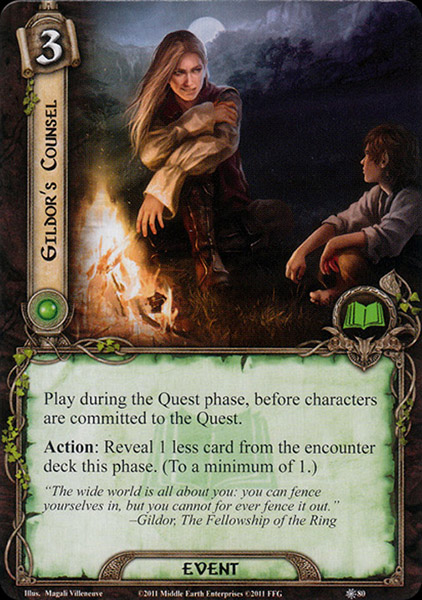This is a really good card which I think is somewhat underused and underappreciated, including by me. There are I think three main reasons why:
-
It does nothing in solo play. There is a significant portion of the community who only play this game solo, and barring the odd quest which makes you reveal extra staging cards, Gildor's Counsel does absolutely nothing there given the minimum of 1.
-
It doesn't feel like you're doing anything. And of course, in fact, you aren't. Playing this card doesn't actually do anything to the state of the game when you play it, it merely prevents one encounter card being added to it. As such it doesn't feel as potent as playing an ally or attachment which directly alters your boardstate moving forward, or a different event which clearly interacts with the boardstate at the time (or at least with your hand). This is kind of an illusion though, this card is in fact very powerful. And of course unlike other preventative cards like A Test of Will or Feint, you don't get to choose what you prevent (unless you've scried the encounter deck), but regardless, less encounter cards is pretty much always better.
- It costs 3 resources. This one is a valid problem to have as 3-cost cards can be difficult to afford. After all, that's all the resources you get for a round spent on one card. And of course if, as is likely, you're not playing mono-, it will in fact take you more than one round to get enough resources to play this event. Combine that with the fact that access gets you some good card draw to fill up your hand with a wide variety of other good cards you could be playing, for less resources and this becomes a difficult sell. However a bit of logic would suggest that this is an absolutely worthwhile way to spend 3 resources in a multiplayer game, pretty much by definition.
Consider, in this game, the number of cards revealed in staging each round is equal to the number of players in the game. Ergo, in order to be pulling their weight and at least maintaining parity with the encounter deck, each player deck should be in one way or another dealing with the consequences of one encounter card reveal. Of course there are complications thrown into this by any quest effects producing additional cards and whatever cards were already there in setup, but by and large it holds true as a general principle - one deck should be able to deal with one card every round. And in this light it makes perfect sense that Gildor's Counsel costs the exact number of resources most decks will generate each round, because this is in fact the most direct way for a deck to deal with its one card for the round - at the cost of the full round's worth of resources, it simply deals with that card by not revealing it in the first place. And of course that's just the resources - whatever boardstate that deck has in play can still contribute and allow that deck to handle more than its one card for the round.
And that's all there realy is to say about it. Gildor's Counsel isn't a flashy card - as noted, it doesn't directly do anything, and it's a bit on the costly side. But it is logically, mathematically, worth that cost, and as such I would say that if your deck can reasonably afford to play it, you should probably at least think about putting it in.
